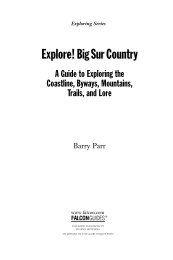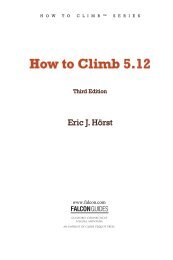Free pdf from Camping's Top Secrets - Falcon Guides
Free pdf from Camping's Top Secrets - Falcon Guides
Free pdf from Camping's Top Secrets - Falcon Guides
You also want an ePaper? Increase the reach of your titles
YUMPU automatically turns print PDFs into web optimized ePapers that Google loves.
G<br />
GPS (Global Positioning System)<br />
he hottest navigational device is the handheld<br />
GPS (Global Positioning System) receiver. With a<br />
GPS unit, you can determine an accurate position<br />
anywhere on Earth in a matter of minutes. Or you<br />
can enter a set coordinates of a place you want to<br />
go and the GPS receiver will provide a compass<br />
bearing and distance that will be updated by satellite<br />
information as you progress. Press a button<br />
and you get a speed readout and an estimated<br />
time of arrival. You must be moving faster than<br />
about 11 miles per hour to get an accurate measure<br />
of your speed. Hikers and canoeists should<br />
not take GPS speed readings too seriously!<br />
Without a map, GPS can be used to track<br />
your location. Enter your starting position into<br />
the unit and save it as a waypoint. Establish<br />
other waypoints as you proceed, then, like<br />
Hansel and Gretel, follow your electronic bread<br />
crumbs home. GPS accuracy is 3 meters or less!<br />
You must know how to read and interpret<br />
topographic maps in order to master GPS technology.<br />
You must also have—and know how to<br />
use—an accurate compass. he one built into a<br />
GPS has limited capabilities. Be aware that all<br />
handheld GPS units operate on small batteries<br />
that could fail when you need them most. Most of<br />
the new hand-held GPS units are waterproof so<br />
you can safely use them in the rain. Submersion<br />
in water for a very long time is another matter.<br />
It is not practical to leave a GPS unit on for<br />
continuous positioning unless you have battery<br />
recharging capabilities or an unlimited supply of<br />
batteries. Lithium batteries are a smart choice,<br />
even in summer, when you don’t need reliable<br />
cold-weather performance. he most useful GPS<br />
GPS (GLOBAL POSITIONING SYSTEM)<br />
feature is its ability to verify your location on a<br />
map—possible only if your map has a reference<br />
system to which your GPS unit can relate. Not<br />
all maps have appropriate reference lines. hose<br />
that do include all US and Canadian topographic<br />
maps that are marked with degrees of latitude<br />
and longitude. Canadian maps and US military<br />
maps also provide decimal-based Universal<br />
Transverse Mercator (UTM) coordinates, which<br />
are much easier to use than latitude/longitude.<br />
Any GPS receiver can be set to read lat/lon or<br />
UTM coordinates, as you prefer. (See page 108.)<br />
Maps that don’t have a coordinate system to<br />
which the GPS can relate include nearly all public<br />
road maps, most state and national park hiking<br />
and boating maps, and special-purpose recreational<br />
maps like those drawn for the Boundary<br />
Waters Canoe Area of Minnesota. If you use one<br />
of these special-purpose maps, you’ll also need<br />
to carry a GPS-compatible topographic map.<br />
Learning to use a GPS unit is like mastering a computer.<br />
If you don’t use it, you’ll lose it! Garmin Oregon 400T GPS.<br />
87








